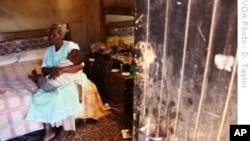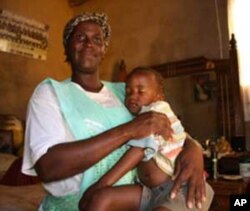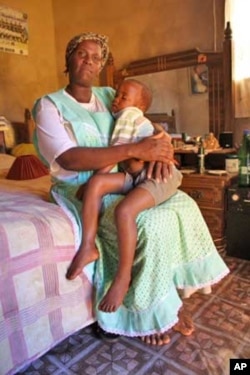On a spring day in rural KwaZulu-Natal province, nature vents its power upon the people of the Valley of a Thousand Hills in the form of a thunder storm savage in its fury. But Cynthia Mkhize has another explanation for the white lightning fizzling and cracking diabolically across the onyx sky above her.
“It is unusual for Unkulunkulu (‘The Greatest One’ - God) to be so angry at this time of year,” she mutters, staring at black clouds swollen with electrical venom as they burst and deluge her homestead.
Mkhize – a 35-year-old mother of six – lives in one of the areas of the world worst afflicted by HIV/AIDS. It’s estimated that one out of every four people here is HIV-positive. Mkhize herself found out she had the virus shortly before she gave birth to her last-born, four-year-old Bongamusa.
After visiting a clinic and getting advice from doctors and nurses there, Mkhize says she made the “most important decision” of her life. “I decided to feed my child breast milk and nothing else. I was motivated to do this for my child. I knew that if I did not, he could also get HIV,” she says.
A combination of the antiretroviral drugs Mkhize took and the safe breastfeeding she practiced saved Bongamusa from infection. Today, he’s HIV-free.
Without his mother’s action, Bongamusa would probably have joined the ranks of the 60,000 South African children born every year with HIV. Their infected mothers pass it on to them during birth, or the youngsters are infected during breastfeeding. The breast milk of infected women contains HIV. Research in South Africa has shown, though, that when such mothers exclusively breastfeed their babies for the first six months, fewer children become infected.
Exclusive breastfeeding means the babies are fed only breast milk and no solid foods, formula or even water. But in South Africa, where discrimination against HIV-infected mothers is rife and the women are often malnourished, the medical advances regarding breastfeeding are constantly threatened.
International medical research has shown the safest way for HIV-infected mothers to feed their babies is with formula milk. However, in Africa, the formula is often not available, and women often don’t have access to the clean water that’s needed to mix the formula.
Culture also plays a role, says Patience Mavata, a nurse and clinic manager in the KwaZulu-Natal midlands.
“In South Africa, as well as in most of Africa, there is a strong cultural belief that babies must breastfeed, no matter what. When you are not breastfeeding, your child is losing the nutrients that the child is supposed to be getting. So the child will grow up with a lot of illnesses, because [its] immune system is not strong,” she explains.
Professor Hoosen Coovadia, a top South African HIV/AIDS scientist, agrees that breastfeeding is “one of the major benefits of humankind for children…. It’s something natural and it’s good for the baby, it’s good for the mother, it’s good for the family.”
The pediatrician says research, including his own, has proven that “breast milk is best” for babies, and that other methods to feed the youngsters should be considered “last resorts.” Coovadia says of all the ways to prevent the deaths of the estimated 10 million children who die every year in the developing world – such as vaccinations – safe breastfeeding is “top of the range.”
But, says Mavata, most HIV-positive mothers in Africa practice “dangerous” breastfeeding that opens their infants to HIV-infection. For diverse reasons, they feed their babies solid food, and water, in conjunction with breast milk.
Coovadia says this greatly increases a child’s chance of getting HIV.
‘The virus passes through a damaged gut….’
The South African doctor has completed research around breastfeeding and HIV-positive mothers that’s been widely praised in the international medical community.
Coovadia’s unit in Durban, the biggest city in KwaZulu-Natal, has shown that HIV-positive mothers who exclusively breastfeed their babies for the first six months of the infants’ lives are far less likely to transmit the virus to their offspring than those who practice “mixed” feeding.
“The study proved that babies that were fed formula or powdered milk, or animal milk, in addition to breast milk, were nearly twice as likely to be infected with HIV as those who got breast milk only,” the professor says. “But what was really dramatic was that babies that were given solid food, mixed with breast milk, were almost 11 times more likely to be infected with HIV than those who were fed breast milk only.”
Coovadia explains, “The argument is that if you give a very small baby more solid stuff to ingest, it damages the baby’s gut (stomach), which is at a very early stage of development. And the gut is a really protective organ…. And then the HIV that’s in the mothers’ breast milk goes through the baby’s damaged gut and into it.”
Contaminated water has the same effect, he says.
Coovadia’s research found that HIV-infected mothers should breastfeed their babies for only the first six months and then should stop. This is to prevent the child from being exposed to the infected milk for too long, to minimize the risk to the baby.
The doctor’s study concluded that breast milk shields a baby from HIV-infection. “The nutrients in breast milk strengthen the mucous lining of the gut, so there’s much less chance of the HIV infecting the baby,” he maintains.
Prior to research such as that undertaken by Coovadia, medical experts had recommended that HIV-positive mothers bottle-feed rather than breastfeed to protect babies from being infected. This caused immense controversy because up to that point the World Health Organization had promoted breastfeeding in Africa, in particular, because breast milk provided babies in poor areas with immunity against disease.
But HIV and corresponding recommendations to HIV-infected mothers not to breastfeed threatened to wipe out all the WHO’s work.
It was this “butting of heads” that prompted Hoosen Coovadia to set about finding ways of “preserving the African culture of breastfeeding” even among HIV-positive mothers and in poor areas of the continent, where infected mothers simply can’t afford to feed their children with anything other than breast milk.
“The issue here in Africa is finding ways to make breastfeeding safe, because for most women here breastfeeding is the only alternative,” he says. “They either don’t have access to clinics that provide formula for the babies or the clinics simply run out of feeding formula….”
But Coovadia acknowledges that “things aren’t so simple. You can’t just tell infected mothers to only give breast milk and expect this to be embraced overnight. Oh, no. There are a hell of a lot of challenges involved….”
Family is the biggest challenge
The scientist says “one hundred percent” exclusive breastfeeding is “alien” to most cultures around the world, including in Africa. “The grandmother will say, ‘Oh, it’s too hot today. Let’s give (the baby) some extra water.’ Somebody else will say, ‘Oh, the baby is too thin. Let’s give him some solid foods.’”
And when this happens, says Coovadia, the baby’s chances of being infected with HIV “go sky high.”
Nurse Mavata adds, “The water to mix the formula is not clean out there. That can make the child even sicker.” Coovadia says when babies ingest dirty water, “far more end up dying of diarrhea than otherwise would have died from HIV.”
Cynthia Mkhize says family members tried to “force” her to give her son, Bongamusa, solid food and water when he was a baby. But she refused.
“HIV-positive mothers have to use their love for their children as motivation. They must not listen to people who tell them to feed their children anything else but breast milk. Don’t give in to the pressure,” Mkhize emphasizes.
But Mavata says most HIV-infected mothers aren’t as strong as Mkhize, and they “surrender” to demands made by family in terms of a baby’s diet. “The family is maybe the biggest challenge to correct breastfeeding practice,” she comments.
Mavata says men who are aware that their wives or partners are HIV-positive but are ignorant of the benefits of exclusive breastfeeding, demand – often with an accompanying threat of violence –that mothers not breastfeed the baby, fearing transmission of the virus to the child.
But relatives who don’t know that the mother is HIV-positive in turn demand that the woman breastfeed her infant. “So there’s a clash, and the woman is torn apart,” Mavata says. “A mother-in-law is saying, ‘I want you to give your baby the breast milk!’ And the father is saying, ‘No, you’re going to give the virus to my child!’
The nurse says the mothers “do not know which way to turn” and, in a bid to satisfy relatives, end up practicing “mixed feeding” and, in so doing, endangering their babies.
Suspicions deepen
Mavata works in a district of KwaZulu-Natal where most people are unemployed. She says poverty and lack of development often result in HIV-positive mothers practicing unsafe breastfeeding. “There is no electricity here. And even if there [were], people cannot afford fridges to cool the breast milk when the weather is hot. So they often end up giving unclean but cool water to their babies, to give the babies some relief from the heat,” Mavata says. “In this way, the babies are again in danger of infection.”
The stigma attached to being HIV-positive and the discrimination suffered by people living with HIV/AIDS in South Africa further increase the vulnerability of children to HIV infection.
Mavata says if a mother is HIV-positive and doesn’t breastfeed her child, “suspicions will deepen” around her. “Communities in South Africa know that once a woman is not breastfeeding at all and is feeding her baby the Pelargon (government-issued formula) from the clinic, then she is HIV-positive. That is when her problems will begin….”
The mothers may be ostracized and become “pariahs,” says Mavata. The women depend on their husbands and partners for income. But the men often abandon them when their HIV-status becomes public knowledge. Fear of this happening compels many mothers to do their utmost to keep their conditions secret.
“The women will hide the Pelargon, and put it in different containers. They call it ‘de-canning.’ This compromises the child, when you are de-canning into a container that is dirty,” Mavata says.
In South Africa’s Free State province, Dr. Petro Basson is also struggling to save youngsters from HIV-infection. According to her, communities are now identifying women as being HIV-positive if the women choose to exclusively breastfeed their babies. The result is “terrible discrimination” against the women.
“People say, ‘Ah! That woman refuses to give her child anything else but breast milk. That means she has AIDS. We are going to tell everyone that she has AIDS and warn them to stay away from her….’”
So when health workers advise HIV-positive mothers to practice exclusive breastfeeding, says Basson, many do the opposite. “They will not exclusively breastfeed - although they know they’re HIV-positive, just to prove to other people that they’re not HIV-positive. So in that way, (they) put the child’s life (in) danger.”
Mavata says malnourishment is also a “serious threat” to efforts to encourage HIV-infected mothers to exclusively breastfeed.
“A lot of these women do not eat properly because they are so poor. Malnourishment results in women being unable to breastfeed. When you are too hungry there is no milk that is coming out of you.”
Mavata says she recently treated a young HIV-positive woman who had been “living in the bush,” where she gave birth. “When mother and baby were found by our care worker, they were both very, very thin. The mother had been trying to breastfeed her baby, but because she was so malnourished, she was not able to produce milk. The child was still sucking, but was sucking nothing. When that happens, the nipple is not healthy. That means the child was like sucking the virus,” she says.
Mavata says the woman unwittingly passed HIV on to her baby, probably through blood from a nipple ruptured by the child’s constant sucking, and has since died of AIDS-related tuberculosis and kidney infection. The child faces an “uncertain future,” the nurse states, and adds, “To me this episode highlights that the mothers really need to be fed properly, if we are going to fight this epidemic in any meaningful way through breastfeeding practices.”
‘Hopelessly insufficient….’
Coovadia says an “ideal situation” would be for safe, exclusive breastfeeding to be used in conjunction with highly active antiretroviral drug therapy. He maintains there’s an “almost zero percent chance” of mothers who take the medication and who give their offspring only breast milk, to pass the virus on to their babies.
But few HIV-positive pregnant women in Africa have access to the drugs, and that’s why health experts are placing so much emphasis on exclusive breastfeeding as a way to decrease numbers of children born HIV-positive.
Still, says Coovadia, South African and international initiatives aimed at promoting safe, exclusive breastfeeding have been “hopelessly insufficient,” with very few HIV-positive women aware of the strategies that could prevent them infecting their children.
“If we’re promoting (exclusive breastfeeding) and the women are not following it, whose fault is this? It’s not the women’s fault; it’s something wrong with us! I mean, if every day I say ‘stop smoking’ and nobody stops smoking, there’s something wrong somewhere,” the scientist remarks.
The affected women in the most isolated, HIV-ravaged communities in Africa simply aren’t being reached with the correct messages, Coovadia says, because the world has failed to implement a “comprehensive education program” about the benefits of exclusive breastfeeding, and dangers of mixed feeding.
He comments, “Against smoking and obesity and alcohol abuse, the world has mounted campaign after campaign. But the same has not been done for exclusive breastfeeding. We have to make a concerted, worldwide effort to promote this. Otherwise we will sit back and watch countless more babies dying as a result of being infected with HIV.”
This is part 11 of our 15 part series, A Healthy Start: On the Frontlines of Maternal and Infant Care in Africa






